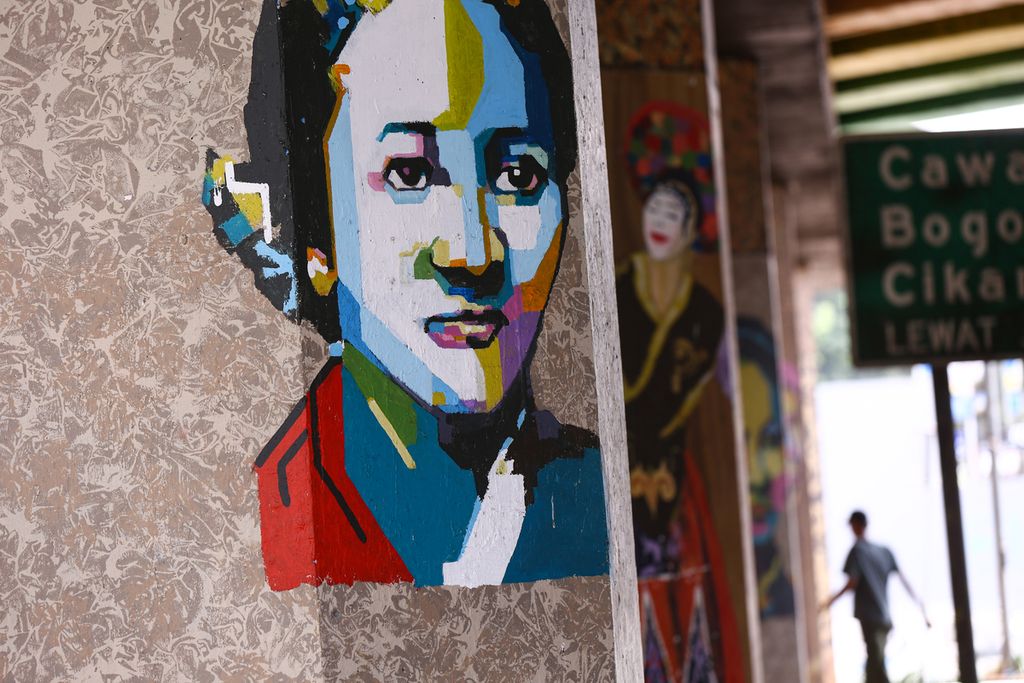‘Post-Kartinian’, a Narrative about Kartini
The state has the opportunity to open up the truth to "straighten out" and interpret "Kartinis" who have begun to get trapped and imprisoned in the name of industrialization and modernization.
/https%3A%2F%2Fkompas.id%2Fwp-content%2Fuploads%2F2020%2F04%2F20200412kum102_1586835785.jpg)
A poster of Raden Adjeng Kartini decorate the walls of the house on Jalan Halim Perdana Kusuma, Tangerangl City, Sunday (12/4/2020). RA Kartini is known as a figure of women\'s emancipation, especially in fighting for the right to education for women. April 21 is celebrated as Kartini Day.
Observers of women issues are often trapped between two diametral poles: scripturalist and pragmatic.
Scripturalists insist that womanhood is a construction of text, while pragmatists think that womanhood is a symbol of the struggle for justice. This paper tries to understand Kartini\'s character through a contemporary construction called post-Kartinian. The Post-Kartinian view in this case offers a perspective on Kartini from a history perspective that is natural and humane.
Scripturalists insist that womanhood is a construction of text, while pragmatists think that womanhood is a symbol of the struggle for justice.
Rereading Kartini
The scripturalists narrate Kartini as a perfect Javanese woman at the end of the nineteenth century. A woman who is able to explain the ideal view of a world full of tolerance, participation and emancipation.
On the other hand, the pragmatists see Kartini as not just an ideal woman, but as a symbol of resistance. The narrative is always confronted with issues of injustice, intolerance, gender bias, inequality. In their extremes, both of them hardly place historical space as a way to critically understand processual dialectics.
Also read: Kartini Day Amid Covid-19
The scripturalists are trapped even more by drawing on ethics, norms, customs and even religiosity as methods of interpretation and validation. Meanwhile, the pragmatists are more complacent with political overtones and injustice.
This binary way of thinking actually reduces the existence of women. It should be understood that women are not just “not men” that are ahistorical. The complexity of women is becoming increasingly dwarfed by a binary and political point of view. Women with a historical capacity are squeezed into a frame of binary poles that have never met.
/https%3A%2F%2Fkompas.id%2Fwp-content%2Fuploads%2F2020%2F03%2F20200308_ENGLISH-HARI-PEREMPUAN_A_web_1583679045.jpg)
A woman holds up a poster objecting to systemic patriarchy during a peaceful march on Sunday (8/3/2020) to mark International Women\'s Day 2020 in Central Jakarta. The march, which covered the entire length of Jl. M.H. Thamrin during Sunday’s Car Free Day and called for diversity, gender equality and the elimination of violence against women, was organized by the Allied Movement of Women Against Violence.
Kartini was born during the heyday of the Javanese feudal regime. The bankruptcy of the Tanam Paksa (forced cultivation system) in 1830-1870, as a result of maladministration and corruption, became a turning point in the position of the Javanese feudal lords. The colonial position was getting weaker, replaced by the liberal-capitalist group who played the role of the colonial state. Structural changes in all fields began to appear, including the emergence of critical urban groups. Kartini must be viewed in the context of this strong wave of change.
On the other hand, feudal groups began to build small "kingdoms" in their respective territories without being separated from the feudalistic and nepotistic ties with the colonials. Kartini learned how feudalism was built and cosmopolitanism grows through international networks. The wealth and luxury of the aristocrats grows much faster than that of the rural and urban people. Cosmopolitanism in Jepara had grown beyond that of other cities on the north coast of Java.
Also read: They Refuse to Give Up
Feudalism and cosmopolitanism turned Kartini into an "agent" of cultural dialogue between colonial rulers and the colonized. The view of the piningit woman (isolated woman) trapped in the orthodoxy of tradition, which so far has become the "Kartinian ideology", needs critical space to reread it. The piningit ideology has been understood as having denied Kartini as a free, creative, critical and in the end dialectical-historical human being.
Living in a colonial cosmopolitan realm in late nineteenth and early twentieth century Java, her social and cultural reflections came out with various ideas of modernization and progress. Her burst of thought had a critical tone, and it could not have been a sudden burst from an isolated human.
Kartini, a historical figure
Kartini has shaped herself in the spirit of the times, the zeitgeist, which was marked by a complicated relationship between the power of feudalism and cosmopolitanism. She reinterpreted the freedom, participation and modernization that were expected to emerge with colonialization. An ideal form of emancipation, which is not only understood as a women\'s struggle.
The feudal world that became the reinforcement of local identity was helpless when it was under the shadow of colonial rule.
/https%3A%2F%2Fkompas.id%2Fwp-content%2Fuploads%2F2021%2F04%2F9cc27f9e-84b1-481a-9539-32a26149e606_jpg.jpg)
Sabaniah (72), a member of the garbage bank group processing plastic waste in Lapulu, Kendari, Southeast Sulawesi, Saturday (27/3/2021). Together with other women, she turns waste into crafts. This group of the Coastal Women\'s Network of waste banks processes waste generated from scavenging for environmental preservation and the welfare of members.
Kartini did not appear as the isolated woman she has been portrayed as by the "historical account", which often becomes a general narrative. She dismantled the power relations of feudalism and colonialism for a modernity.
The modernization Kartini sought was none other than the practice of dialogue between feudal orthodoxy and colonial modernization. Here it is necessary to reread emancipation as an ideological symbol attached to Kartini by placing it in a context. Contextualization provides space for interpretive liberation that clears the very ideological scripturalist and pragmatic ties.
Also read: Boost Protection for Women
De-ideologization of Kartini by considering the context will further humanize Kartini\'s narrative as a socio-historical construction. The courage to use the socio-historical context as an approach will end both scripturalist and pragmatic debates. Social processes within the boundaries of time and space will provide new meanings to reinterpret Kartini.
A character who does not live in solitude, piningit, but goes through dynamics that sometimes overlap in complex social processes in interpreting the life of her nation.

A mural of the figure of the revival of Indonesian women, RA Kartini, adorns the under the toll road on RC Veteran Raya, South Jakarta, Tuesday (21/4/2020).
The ‘post-Kartinian’ approach
Kartini was only one among many women who interpreted the encounter between feudalism and modernization of her era. Outside, there are millions of "Kartinis" who had to go against the flow of women\'s history. These "Kartinis" are outside the cultural circle in which Kartini grew up.
They thrive or struggle to survive. Workers, farmers to babu-babu (domestic assistants) are social spaces that become hope. They are forced to remove the boundaries of public and domestic space, and even they are no longer able to distinguish between day, night and fading light.
They are in a world different from Kartini’s. They are not heroes written about in thick history books. The nation\'s educated people hardly know them. They drop out of the collective memory of the nation, but are seen on city thoroughfares, dirty narrow alleys, shabby markets and rickety houses along the side of the canals just to take shelter from the rain, the hot sun and to make a living.
Also read: Mother\'s Day and the New Order
Emancipation, or whatever it is called, is just a text of the scripturalists tucked away neatly in a row of papers in the corner of a fancy office. The loud voice in the name of the law by the pragmatists is never heard by those who are preoccupied with the marginal world. Their voices sometimes come out ahead of elections for a village head or head of state.
Kartini\'s voice can still be heard by anyone looking for the truth.
Industry and capitalization have buried their existence. The emergence of foreign industries in cities and villages seemed to provide heaven. They are not aware of their future. The alienation from the world of education was built early on. It is not learning classes or educational institutions that are used as ways to open doors for progress as Kartini dreamt of, but a “heaven” of capitalism that has become a new hope. Alienation from woman issues, then, becomes a common phenomenon when there is a misinterpretation in the name of emancipation.
The history of women with all the sorrows and happiness is only for academic consumption. There are centers for women\'s studies on campuses, gender courses are offered, seminars and "research" are encouraged. However, those "Kartinis" remain untouched. Not because they are an intangible, abstract and vague group, but because academic intelligence and theoretical tools are incapable of touching them.

Arif Akhyat
Kartini\'s voice can still be heard by anyone looking for the truth. The state has the opportunity to open up this truth to "straighten out" and interpret those "Kartinis" who have begun to get trapped and imprisoned in the name of industrialization and modernization.
Arif Akhyat, Historian, Department of History, Cultural Studies, UGM
This article was translated by Kurniawan Siswoko.